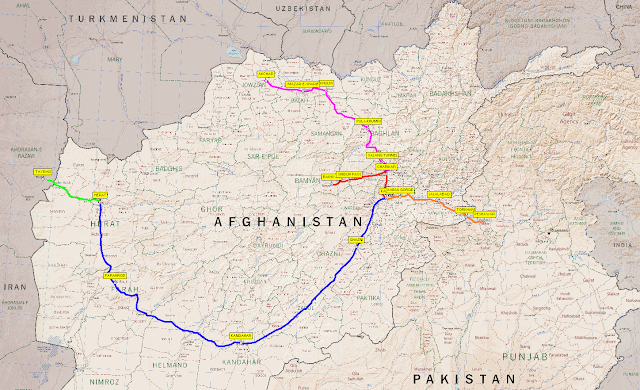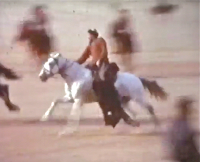Are you mad? Surely it's not possible?
Well, no we aren't and yes it is, or was. We did it, and it was great, one or our lives' best adventures and we are still here to report on it.
You probably can't do the same trip now, certainly not as freely or safely as we did, so in view of all the negative press that Afghanistan gets these days, we thought this nostalgic report on our visit might be of interest.
We've broken our adventures into 6 major sections, shown on the map below, or you can go direct to the Article Links and descriptions if you like.
You might even be motivated to visit Afghanistan yourselves one day, once the wreckage of war (physical and political), has been removed. We were surprised how pleasant it was and in fact it was our favourite country, by far, that we've travelled through.
Our motivation in compiling these articles was prompted in part by this quote from Benjamin Franklin:
"If you would not soon be forgotten, either write things worth reading or do things worth writing."
Hopefully, we have done a bit of both.
David and Janet Ribbans,
Adelaide, South Australia (since 1975)
-----------------------------------------------------------------------------------------------------------------
A bit of background
Sadly, Afghanistan has been getting a very bad name in recent years due to the ongoing conflicts in that country. Most current reviews of Afghanistan focus almost entirely on the negative impact of wars in the country over the past 30 years and present the Afghanistan of today as a country with a violent and dangerous society.
But it's a totally undeserved reputation because Afghanistan really is a beautiful country and the people really friendly and we loved it.
Unfortunately, very few reports or websites provide a glimpse of the Afghanistan that existed up to 1978, when a communist coup started the slide towards Soviet invasion and the rise of the Taliban regime, or as it could be again, once the ravages of war have been erased from the countryside, and political stability has been fully re-established.
Hopefully these articles will go some way to correcting this imbalance.
For a bit more background on Afghanistan, visit this post for answers to these questions:
- How big is Afghanistan?
- Is it really a friendly country?
- Is there tourism in Afghanistan?
- Do Afghans play cricket?
-----------------------------------------------------------------------------------------------------------------
Our travels though Afghanistan
Finding a route through Afghanistan was not difficult as there are very few main roads. There are a lot of unsealed tracks, much like outback Australia, but all the main centres are linked by one major highway which extends around 2/3 of the country. For centuries it has formed part of an major trading route from Istanbul to Calcutta (called the Grand Trunk Road in Pakistan and India).
The major centres are Herat, Kandahar, Ghazni, Kabul and Jalalabad, all of which are on the southern part of the highway. We also made 2 special trips from Kabul, the first was to see the giant statues of Buddha in the Bamiyan Valley in the centre of Afghanistan, and the second was over the Hindu Kush mountains to Mazar-e-Sharif in the north of the country to seek out the ancient game of Buzkashi. Both highlights were well worth the effort.
The route we took through Afghanistan
(Click the links below to go direct to related articles)
No Track shown: Getting there and getting in Green Track: Iran to Herat
Blue Track: Herat to Kabul Red Track: Kabul to the Bamiyan Valley
Mauve Track: Kabul to Mazar-e-Sharif Orange Track: Kabul to Jalalabad and Pakistan
-----------------------------------------------------------------------------------------------------------------
[Note, no digital cameras were harmed in the preparation of these articles, there weren't any back then, or PCs and no Internet, so all the photos are scans from 35mm slides or Standard-8 movie films, hence the imperfect quality.All the photos can be clicked-on to see larger versions in Picasaweb (Control-Click on a PC or Command-click on a Mac to open them (or any other links) in a new window or tab).With one exception (a CNN photo of Bamiyan), all the photos and movies were taken by us using a Practica LLC 35mm SLR and Kodakchrome slide film, or shot in Standard-8 format using a Yashica wind-up movie camera with no audio.We've resisted using any current day photos (and there are plenty on the Internet) as they depict an image of Afghanistan which is unfamiliar to us, and we want to remember it as it was, not as it is now. Shiny new CBD office blocks, destroyed monuments and burnt out tanks are not our memories of Afghanistan.]
-----------------------------------------------------------------------------------------------------------------
Section 1: Getting there and getting in (http://jcribbans.blogspot.com/2010/01/motorhome-tour-1974.html)
The road east...
Summary
We'd bought a Series 2A LWB Land Rover the previous year and spent 18 months converting it to a motorhome and repairing or overhauling almost every moving part for the long and unknown trip ahead.
It must have been quite a good conversion because a German tourist complimented Janet on "her very beautiful bus". At least I think that's what he said.
Having got there, how did we rate Afghanistan against Iran and Turkey? Or against Pakistan and India, or even Nepal?
Click here to visit the full article.
Section 2: Herat, our first big Afghan town (http://jcribbans.blogspot.com/2010/01/herat-first-look-at-afghanistan.html)
Green Track: Iran to Herat
Summary
Was it as bad as everyone in Iran said it would be, like going back 1000 years? Or worse? Were the Afghan tribesmen as fierce and aggressive as they had been in 1842 when they wiped out an entire British army?
Herat was the first big Afghan town we came to in the late afternoon and it was dusty and noisy and bustling with people. But in our diary of the time I noted that "Herat was the most pleasant town of the entire journey"?
I also noted that we weren't prepared for the intense cold and that 3 pairs of socks were not enough.
Click here to visit the full article.
-----------------------------------------------------------------------------------------------------------------
Section 3: Herat to Kabul (http://jcribbans.blogspot.com/2010/01/arriving-on-1-dec-1974.html)
Blue Track: Herat to Kabul
Summary
1100 km across the country on their Highway 1, part Russian built, part American built, 100% interesting.
From Herat through Farah, the Desert of Death, Kandahar, Ghazni to the capital Kabul. With deserts, walled forts, ancient monuments and snow capped mountains for company, but no guns, tanks or foreign forces. We had the Afghans all to ourselves, and vice versa.
But I did loose my wallet along the way.
Click here to visit the full article.
-----------------------------------------------------------------------------------------------------------------
Section 4: The Buddhas of Bamiyan (http://jcribbans.blogspot.com/2010/01/buddhas-of-bamiyan.html)
Red Track: Kabul to the Bamiyan Valley
Summary
A visit to the immense statues of Buddha carved into the Bamiyan cliffs in central Afghanistan didn't disappoint us (at the time). The spectacular journey over icy mountain passes to the picturesque valley was the scenic highlight of the trip. Subsequent events have saddened us though.
Built in the 5th century, the 175 ft (50 m) high statues survived 1500 years of invasion and religious challenges, but were then destroyed in a mindless act of desecration by the Taliban in 2001.
They are now just empty shells but we saw them in all their glory in a beautiful but freezing Afghan winter setting.
Click here to visit the full article.
-----------------------------------------------------------------------------------------------------------------
Section 5: Buzkashi, the Trek North (http://jcribbans.blogspot.com/2010/01/buskazi-trek-north.html)
Mauve Track: Kabul to Mazar-e-Sharif
Summary
A trip over the snow covered Hindu Kush mountains and through the Salang Tunnel to the north of Afghanistan, to seek out the ancient sport of Buzkashi on the plains of Central Asia. Our search took us to the major centre of Mazar-e-Sharif, the ancient city of Balkh and the small town of Akcha near the Russian border.
Buzkashi is a thrilling, ferocious sport of combat by rival horsemen over the body of a headless goat, or in our case the carcass of a headless calf, although it wasn't a carcass, or headless, when it walked on to the arena. There are several movie clips of Buzkashi here, one of which is very gory, but it was an exhilarating experience.
My palms were sweating after I read my own words on that trip.
Click here to visit the full article.
-----------------------------------------------------------------------------------------------------------------
Section 6: Leaving Afghanistan (http://jcribbans.blogspot.com/2010/01/leaving-afghanistan.html)
Orange Track: Kabul to Jalalabad and Pakistan
Summary
Getting out of Afghanistan had its challenges.
The Kabul Gorge road is an amazing feat of American engineering during which the road drops down more than a mile from a freezing 7000 ft (2000 m) to a subtropical 1700 ft (500 m) in only a few km of ziz-zag road, carved and tunnelled into vertical rock cliffs, and there was no Armco. In Kabul there was snow but in Jalalabad there were palm trees and orange groves.
Then there were customs and visa problems, and the free-for-all contest at the Pakistan border crossing when changing from driving on the right to the left, followed by the Kyber Pass, all while we were towing a broken down Ford Transit van.
Click here to visit the full article.
-----------------------------------------------------------------------------------------------------------------
Can't wait to go there now?
We hope you enjoy our reminiscences, and if your interest in Afghanistan is subsequently aroused, there are companies around that can arrange trips for you, such as Afghan Logistics orSitara.
But bear in mind though that 30 years of conflict have ravaged the country and sadly, city buildings and infrastructure have been badly damaged and the dangerous debris of war still litters the countryside, including land mines and live ammunition. These are slowly being removed from tourist areas as the conflict zones are pushed to the south west of the country.
However, the spirit and friendliness of the people hadn't been dented by the previous hundreds of years of wars and invasions when we were there, so hopefully the current conflicts won't do so either. We just hope that the westernisation scars left by international intervention won't be permanent.
-----------------------------------------------------------------------------------------------------------------
Navigation:

